2月27日午後5時(西海岸時間)はもう目の前。テレビに釘付けになり、俳優の読み上げる「オスカー・ゴーズ・トゥー…」を聞く準備はできた?毎年この時期になると思い出すねぇ。2002年、オハイオの寮に着いた数日後、ルームメイトとアカデミーの授賞式を見たんだよね。で、黒人で歴史上初のアカデミー賞に輝いたデンゼル・ワシントンに歓喜したなぁ。今年もそんな感動を待ちきれず、ちょっと気が早いけど、2005年アカデミーの予想と期待、いってみましょう。
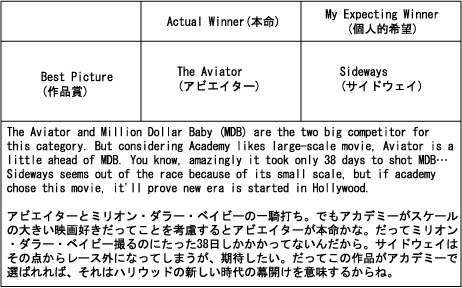
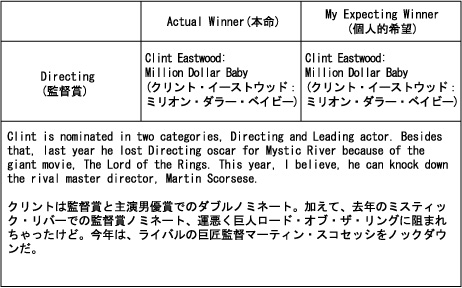

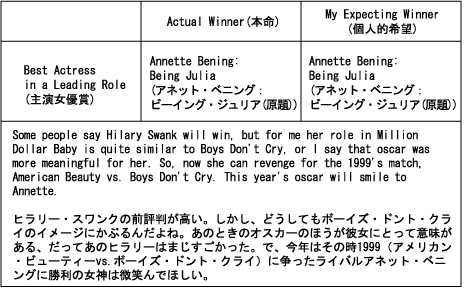
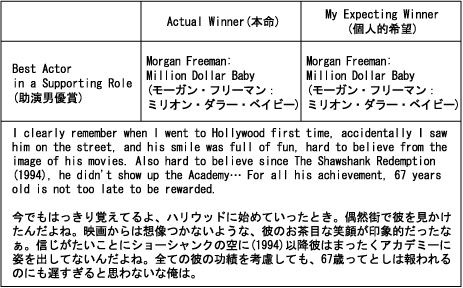
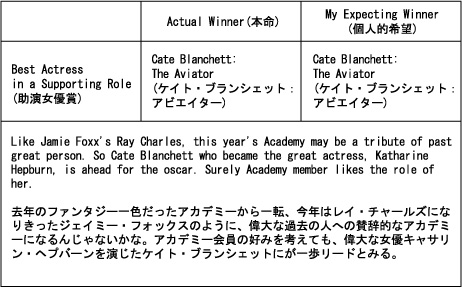






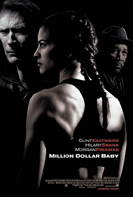

ストーリー: 日々の生活に焦燥感を感じている二人の中年の男達は、1週間のカリフォルニア・ワイナリー巡りの旅に出る。そのうちの一人は結婚という船出が間近に迫っているにもかかわらずに。
「人生の寄り道ロードムービー。」
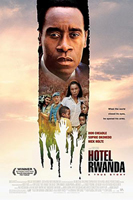
ストーリー: ルワンダが血にまみれた1994年、ある男は家族と1200人以上の命を守ることを心に誓った。ルワンダのホテルのマネージャー、ポールは彼の地位を巧みに利用し、大量虐殺から千人以上もの難民をかくまった。世界が助けの扉を閉ざすなか、彼は人間として現実を乗り越えようとその心を開いた。
基本的に戦争、虐殺物の映画は好きじゃないです。だって見終わった後いやーな余韻が残ることがほとんどだから。。ところがこの「ホテル・ルワンダ」は単なる歴史上最も悲惨だった虐殺劇のドキュメンタリーではなく、男とは何たるものかを教えてくれる映画です。ポールを演じるドン・チードルは2つの異なる顔を巧く混在させアカデミーに価する好演を見せてくれます。印象に残る場面が2つあります。1つは妻に対する愛の場面。過酷な状況下にもかかわらず、彼は妻のためにひそかにホテルの屋根にビールとろうそくを用意しつかの間の安らぎを彼女と分かち合うのです。もう1つの場面。難民の一部を非難させるため、国連のトラックが彼らを連れ去るとき、彼は男としての意を決します。ポールは、夫としての愛、そしてマネージャーとしての勇気を示してくれます。この映画は単に歴史は繰り返してはいけないと言うことを教えるだけでなく、男としての何か大切なものを訴える映画です。
I had one tough cultural difference to get accustomed when I came here first time. It is about the American culture based on Even number.
When I went to coffee shop just to buy a cup of coffee, it always made me confused which coin and how many I should pick up to pay this $1.63… I had to stop, make sure this coin is quarter, nickel or penny, count them, and calculate carefully. Just to get a cup of coffee!
Here U.S., we use unique coin system. We have 1¢,5¢,10¢,25¢,50¢(rarely show up), and $1 coins. What the hell is this strange guy, 25¢, called quarter… How strange this coin is that if I have four of them, it becomes equal to $1, of course, you might say it’s really simple.
However, here is a big conceptual gap with culture of ours or the lest of world. Everybody learned and are used to the decimal system, which uses ten different characters to count number. Another popular counting system is the binary system, which uses two different characters, 0 and 1. But before I came here, I’ve never used this “no-name system,” which uses four numbers to count in my life. Anyway, it took a little time to get used to it.
But this difference is not only related to the way to count, but also came from deep cultural difference in America. While I live here almost three years, I had many experiences making me realize many aspects of American culture are based on even number.
In addition to inconvenient aspect of it, there are also some advantages of using quarter, of course. For example, we have total $1 which consists of four quarters. It can be divided by 1, 2 and 4. So, we can easily share the four quarters by four, two or even one people. However, if we have total 100yen which consists of all 10yen coins, we can divide them only by 10, 5, 2, 1 people, even we have ten coins!! Quarter system is quite useful if we want to divide something in half or quarter and it is strongly related to even number. On the other hand, most of country uses decimal coin system which uses coins with 1, 2, and 5 number. The advantage of this system is that we can count any kind of number by using the minimum number of coins. This advantage is seen also in the experiment of science class using a balance weight for traditional scale, it has 1g, 2,g, 5g.
This difference makes America interesting for me. The Even number culture implies people here likes to divide everything in half or quarter. The same culture can be seen when I measure by using inch system. I am so used to metric system, but sometimes I have to use inch system depends on my project. Then, it’s interesting, when I need to divide something by even number, I like to use inch system. But if I want to divide it by odd number, especially 3, I hate to use inch system because 1inch is equal to 2 of 1/2in, 4 of 1/4in, 8of 1/8, and so on…I can’t divide it by 3, never!
Another example to prove America’s even number culture is seen on a set of dishes. I am not sure about the other country, but in Japan, mostly a set of dishware consists of five pairs of plate, cup and bowl. On the other hand, here and I guess also in Europe, their dishware set has four sets in it. It is seldom to see the four sets of it in Japan. If somebody knows, please let me know the reason why dish set is always five in Japan or four in the U.S.
This even number culture can be interpreted also as symmetric culture. Everything needs to be in perfect balance on both left and right hand. On the other hand, in Japan maybe as well as Asian countries, our culture is based on asymmetry. Especially in the field of art or literature, we admire the beauty of its asymmetry; some people consider it as imperfection like the world of haiku. Symmetry has a strong sense of stability, but asymmetry has more natural feeling for me. Because if everything is totally balanced and perfectly completed, it seems so artificial…
Anyway, I cannot conclude which system is better, but there is obvious difference between America and Japan in aspect of counting system and the sense related to it, and it makes this country very unique for me.

